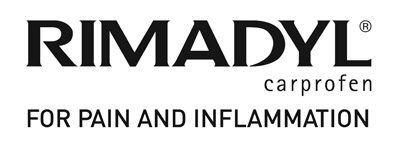Rimadyl Injection

Rimadyl Injection contains carprofen, a non-steroidal, anti-inflammatory drug (NSAID) with analgesic and antipyretic properties for use in dogs, cats and horses.
Home / Species & Products / Dogs / Rimadyl Injection

Rimadyl Injection contains carprofen, a non-steroidal, anti-inflammatory drug (NSAID) with analgesic and antipyretic properties for use in dogs, cats and horses.
Rimadyl Injection is indicated for the control of post-operative pain and inflammation following orthopaedic and soft-tissue (including intra-ocular) surgery in dogs.
In the cat, it is indicated for the control of postoperative pain following surgery.
In the horse, it is indicated for the treatment of musculo-skeletal disorders and for anti-inflammatory treatment after surgery.
As with other NSAIDs the exact mode of action of carprofen has not been defined. Carprofen is a reversible inhibitor of cyclo-oxygenase and a moderate inhibitor of phospholipase A2. It has a minimal effect on those prostaglandins that are necessary for the integrity of gastrointestinal tract and renal function.
Wide Safety Margin & Tolerance
Superior Efficacy
Long Acting
Rimadyl Injection is a clear, sterile, mixed micelle solution, containing 50mg/mL carprofen with benzyl alcohol (1% w/v) as preservative.
Packed in 20 mL multi-dose amber glass vials.
Dogs: The recommended dose is 4mg/kg (1mL/12.5kg) bodyweight by i/v or s/c injection. It can be given perioperatively, either at the time of premedication or induction of anaesthesia, or on recovery from anaesthesia.
Cats: The recommended dose is 4mg/kg (0.24ml/3kg) bodyweight once only, by s/c or i/v injection. The use of a 1mL graduated syringe is recommended to measure the dose accurately.
Horses: The recommended dose is 0.7mg/kg (1mL/70kg) bodyweight by i/v injection as a single dose. This can be repeated after 24 hours.
Note: Both carprofen and warfarin may be bound to plasma proteins. Limited evidence indicates that binding is at different sites, thus enabling concurrent use, but the situation must be monitored carefully. Clinical trial evidence in dogs and cats suggests that only a single dose of carprofen is required in the 24 hours perioperatively; if further analgesia is required in the dog within this period, administer either a single half dose (2mg/kg) of carprofen or an opiate, as necessary.
Store between 2 and 8°C (refrigerate; do not freeze). Once broached, product is stable for use at temperatures up to 25°C for 28 days. Following withdrawal of the first dose, use the remainder within 28 days. Discard unused material.
For intravenous use only in the horse.
Do not administer by intramuscular injection.
Do not exceed the stated dose or duration of treatment.
Do not administer other NSAIDs concurrently or within 24 hours of each other. Some NSAIDs may be highly bound to plasma proteins and compete with other highly bound drugs, which can lead to toxic effects.
Do not use in animals suffering from cardiac, hepatic or renal disease, where there is a possibility of gastrointestinal ulceration or bleeding or hypersensitivity to the product.
Avoid use in any dehydrated, hypovolaemic or hypotensive animal, as there is a potential risk of increased renal toxicity.
Concurrent administration of potential nephrotoxic drugs should be avoided.
Carprofen has been given orally to dogs at up to 5x label dose for 6 weeks, 10x label dose for 2 weeks and at up to 5.7x label dose for 52 weeks, with no clinically significant adverse effects. The ulcerogenic dose for dogs was found to be 30mg/kg orally.
Use in any animal less than 6 weeks of age or in aged animals may involve additional risk. If such use cannot be avoided, animals may require a reduced dose and careful clinical management. In the absence of any specific studies in pregnant target animals, such use is not indicated. NSAIDs can cause inhibition of phagocytosis; hence in the treatment of inflammatory conditions associated with bacterial infection, appropriate concurrent antimicrobial therapy should be instigated.
Withholding Times:
Meat: Horses producing meat or offal for sale for human consumption must not be slaughtered during or within 30 days of last treatment.
Zoetis Animal Health New Zealand Limited. Level 5, 8 Mahuhu Crescent, Auckland 1010, New Zealand. Tel: 0800 650 277, Fax: 0800 628 629. RIMADYL is a registered trade mark of Zoetis Inc. or its subsidiaries. ACVM Registration No. A7084, A7085, A7086 & A8023. RVM; Available only under Veterinary Authorisation.
References:
For technical enquires please phone Zoetis Technical Services: 0800 650 277.

You are leaving the country website to access another site in the group.
Regulatory constraints and medical practices vary from country to country. Consequently, the information provided on the site in which you enter may not be suitable for use in your country.
